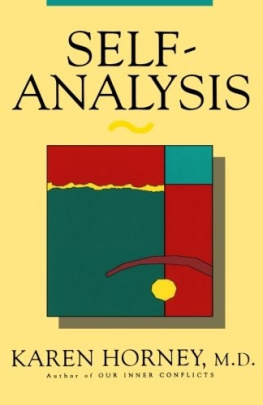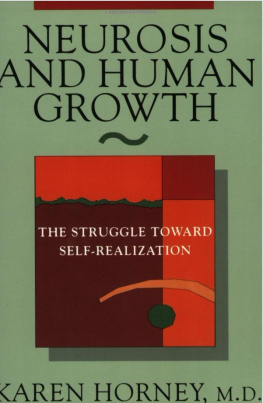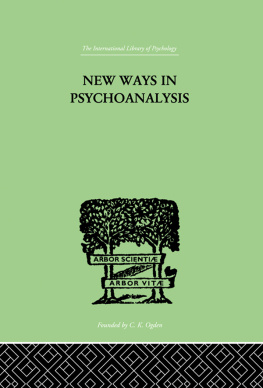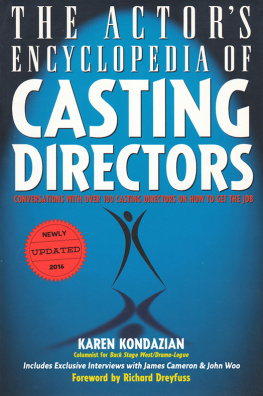Karen Horney - Self-Analysis
Here you can read online Karen Horney - Self-Analysis full text of the book (entire story) in english for free. Download pdf and epub, get meaning, cover and reviews about this ebook. year: 0, genre: Science. Description of the work, (preface) as well as reviews are available. Best literature library LitArk.com created for fans of good reading and offers a wide selection of genres:
Romance novel
Science fiction
Adventure
Detective
Science
History
Home and family
Prose
Art
Politics
Computer
Non-fiction
Religion
Business
Children
Humor
Choose a favorite category and find really read worthwhile books. Enjoy immersion in the world of imagination, feel the emotions of the characters or learn something new for yourself, make an fascinating discovery.
- Book:Self-Analysis
- Author:
- Genre:
- Year:0
- Rating:5 / 5
- Favourites:Add to favourites
- Your mark:
- 100
- 1
- 2
- 3
- 4
- 5
Self-Analysis: summary, description and annotation
We offer to read an annotation, description, summary or preface (depends on what the author of the book "Self-Analysis" wrote himself). If you haven't found the necessary information about the book — write in the comments, we will try to find it.
Self-Analysis — read online for free the complete book (whole text) full work
Below is the text of the book, divided by pages. System saving the place of the last page read, allows you to conveniently read the book "Self-Analysis" online for free, without having to search again every time where you left off. Put a bookmark, and you can go to the page where you finished reading at any time.
Font size:
Interval:
Bookmark:
Self-Analysis
KAREN HORNEY, M.D.
Psychoanalysis first developed as a method of therapy in the strict medical sense. Freud had discovered that certain circumscribed disorders that have no discernible organic basissuch as hysterical convulsions, phobias, depressions, drug addictions, functional stomach upsetscan be cured by uncovering the unconscious factors that underlie them. In the course of time disturbances of this kind were summarily called neurotic.
After a whilewithin the last thirty yearspsychiatrists realized that neurotic people not only suffer from these manifest symptoms but also are considerably disturbed in all their dealings with life. And they also recognized the fact that many people have personality disorders without showing any of the definite symptoms that had previously been regarded as characteristic of neuroses. In other words, it gradually became more apparent that in neuroses symptoms may or may not be present but personality difficulties are never lacking. The conclusion was thus inevitable that these less specific difficulties constitute the essential core of neuroses.
The recognition of this fact was exceedingly constructive in the development of psychoanalytical science, not only increasing its efficacy but also enlarging its scope.
Manifest character disorders, such as a compulsive indecision, a repeated wrong choice of friends or lovers, gross inhibitions toward work, became as much an object of analysis as the gross clinical symptoms. Nevertheless the focus of interest was not the personality and its best possible development; the ultimate purpose was the understanding and eventual removal of the obvious disorders, and analysis of the character was only a means toward this end. It was almost an accidental by-product if in consequence of such work a person's whole development took a better course.
Psychoanalysis is still and will remain a method of therapy for specific neurotic disorders. But the fact that it can be an aid to general character development has come to assume a weight of its own. To an increasing degree people turn to analysis not because they suffer from depressions, phobias, or comparable disorders but because they feel they cannot cope with life or feel that factors within themselves are holding them back or injuring their relationships with others.
As will happen when any new vista is opened up, the significance of this new orientation was at first overrated. It was frequently declared, and the opinion is still widespread, that analysis is the only means of furthering personality growth. Needless to say, that is not true. Life itself is the most effective help for our development. The hardships that life forces upon usa necessity to leave one's country, organic illness, periods of solitudeand also its giftsa good friendship, even a mere contact with a truly good and valuable human being, co-operative work in groupsall such factors can help us reach our full potential. Unfortunately, the assistance thus offered has certain disadvantages: the beneficent factors do not always come at the time we need them; the hardships may not only be a challenge to our activity and courage but surpass our available strength and merely crush us; finally, we may be too entangled in psychic difficulties to be able to utilize the help offered by life. Since psychoanalysis has not these disadvantagesthough it has othersit can legitimately take its place as one specific means in the service of personal development.
Any help of this kind is made doubly necessary by the intricate and difficult conditions that we all live under in our civilization. But professional analytical help, even if it could be made available to more people, can scarcely reach everyone whom it is capable of benefiting. It is for this reason that the question of self-analysis has importance. It has always been regarded as not only valuable but also feasible to "know oneself," but it is possible that the endeavor can be greatly assisted by the discoveries of psychoanalysis. On the other hand, these very discoveries have revealed more than was ever known before about the intrinsic difficulties involved in such an undertaking. Therefore humility as well as hope is required in any discussion of the possibility of psychoanalytic self-examination.
It is the object of this book to raise this question seriously, with all due consideration for the difficulties involved. I have attempted also to present certain basic considerations regarding procedure, but since in this field there is little actual experience to serve as guide my purpose has been primarily to raise the issue and to encourage endeavors toward a constructive self-examination rather than to offer any clear-cut answers.
Attempts at constructive self-analysis can be important, in the first place, for the individual himself. Such an endeavor gives him a chance for self-realization, and by this I mean not only the development of special gifts that he may have been inhibited from utilizing but also, even more important, the development of his potentialities as a strong and integrated human being, free from crippling compulsions. But there is also a broader issue involved. An integral part of the democratic ideals for which we are fighting today is the belief that the individualand as many individuals as possibleshould develop to the full of his potentialities. By helping him to do this psychoanalysis cannot solve the ills of the world, but it can at least clarify some of the frictions and misunderstandings, the hates, fears, hurts, and vulnerabilities, of which those ills are at once cause and effect.
In two earlier books I presented the framework of a theory of neuroses which I have elaborated in the present volume. I would gladly have avoided presenting these new viewpoints and formulations in this book, but it did not appear sensible to withhold anything that might be useful for self-examination. I have tried, however, to present matters as simply as possible without distorting the subject matter. The highly intricate nature of psychological problems is a fact that cannot and must not be disguised, but with full mindfulness of that intricacy I have tried not to increase it by a lumbering terminology. I take this opportunity to express my thanks to Miss Elizabeth Todd for the astute understanding with which she has helped to organize the material. And I should like to thank my secretary, Mrs. Marie Levy, for her untiring efforts. I wish, too, to express my gratitude to the patients who have allowed me to publish their experiences in self-analysis.
Every analyst knows that an analysis proceeds the more quickly and efficiently the more the patient "co-operates." When speaking of co-operation I have not in mind the patient's polite and obliging acceptance of whatever the analyst suggests. Nor am I referring primarily to the patient's conscious willingness to give information about himself; most patients who come to analysis of their own accord sooner or later recognize and accept the necessity of expressing themselves with utmost sincerity. I am rather referring to a kind of self-expression which is as little at the patient's conscious command as it is at the composer's command to express his feelings in music. If factors within himself bar him from expression, the composer is flatly unable to work; he is unproductive.
Similarly, a patient, despite his best intentions to be cooperative, becomes unproductive as soon as his efforts meet some "resistance." But the more frequent the periods in which he is able to express himself freely, the more he can tackle his own problems and the more significant is the common work of patient and analyst.
I have often told my patients that it would be ideal if the analyst merely played the part of a guide on a difficult mountain tour, indicating which way would be profitable to take or to avoid. To be accurate one should add that the analyst is a guide who is not too certain of the way himself, because though experienced in mountain climbing he has not yet climbed this particular mountain. And this fact makes the patient's mental activity and productivity all the more desirable. It is scarcely an overstatement that, apart from the analyst's competence, it is the patient's constructive activity that determines the length and outcome of an analysis.
Next pageFont size:
Interval:
Bookmark:
Similar books «Self-Analysis»
Look at similar books to Self-Analysis. We have selected literature similar in name and meaning in the hope of providing readers with more options to find new, interesting, not yet read works.
Discussion, reviews of the book Self-Analysis and just readers' own opinions. Leave your comments, write what you think about the work, its meaning or the main characters. Specify what exactly you liked and what you didn't like, and why you think so.











